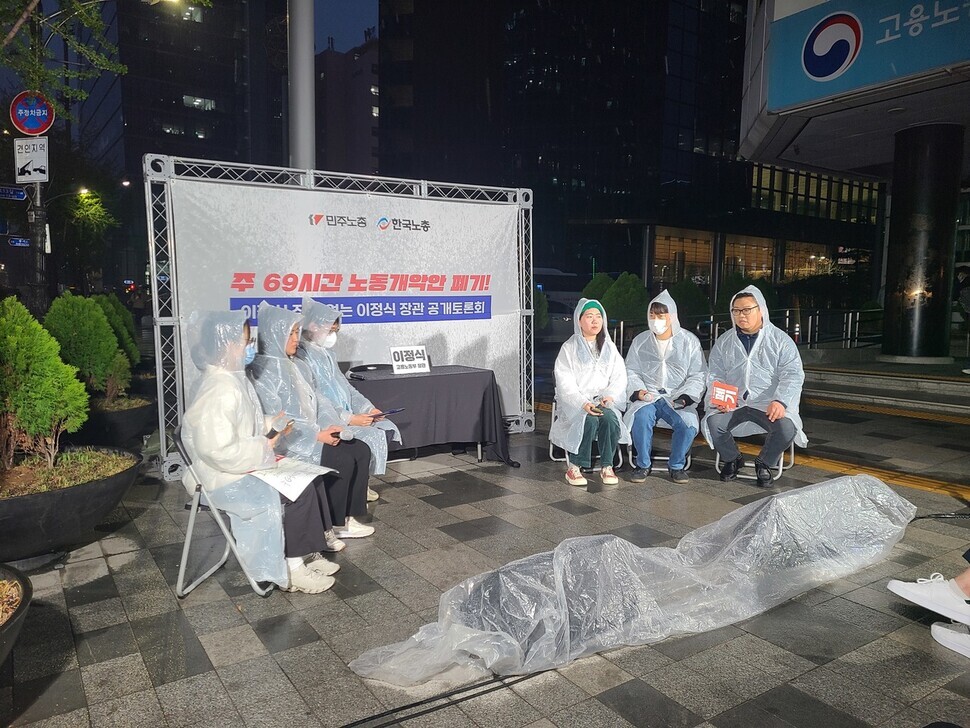hankyoreh
Links to other country sites 다른 나라 사이트 링크
Young Koreans stood up by labor minister at open debate on 69-hour workweek

A group of young workers in rain ponchos sat disappointedly in front of a desk with nothing on it except a nameplate for Minister of Employment and Labor Lee Jung-sik, who had once been an ordinary worker like themselves.
“We don’t want a 69-hour work week. Take a look at all the young workers gathered here today. Can you really stand in front of us with a clear conscience? Could it be that you’re too ashamed to come here in person?” said Kim Hui-seong, deputy chair of the Federation of Korean Trade Unions’ Youth Policy Advisory Council.
Young workers from the Federation of Korean Trade Unions (FKTU) and the Korean Confederation of Trade Unions (KCTU) — Korea’s two main umbrella unions — had shown up for a public debate with Lee in front of the office of the Ministry of Employment and Labor in Seoul on Thursday, but Lee was a no-show.
On March 30, the workers had invited Lee to attend the public debate, which was scheduled for 7 pm on Thursday.
“We requested a public debate with the minister to give him a chance to hear young people in the two umbrella unions with the largest youth membership in Korea. But not only did he fail to show up, but he hasn’t even offered to meet again at some future time,” said Yang Gi-jong, chair of the FKTU Youth Policy Advisory Council.
Lee Jung-sik has been holding industry meetings since President Yoon Suk-yeol ordered a review of proposed changes to work hour rules on March 14, but he hasn’t met with the two umbrella unions.
“He already had something scheduled in Daegu,” explained a spokesperson with the Ministry of Employment and Labor.
In the minister’s absence, the young workers in attendance spoke about the proposed changes to the working hour rules in light of their personal job experience.
Lim Mi-seon, an occupational therapist at a nursing home and head of the Gemcheonsu Nursing Home branch of the Korean Health and Medical Workers’ Union, complained about her heavy workload.
“After eight straight hours of treating between 12 and 18 people, I’m completely wiped out,” she said.
Kim Mi-seong, a member of the National Vocational High School Union, described herself as a 21-year-old office worker.
“There are so many trainees and high school graduates in the workforce who aren’t even guaranteed basic labor rights, just like me and Sohee [a character from the film ‘Next Sohee’]. Instead of taking steps to protect workers like us, [the government] is intent on grinding down corporate workers with a 69-hour workweek,” she said.
“The reality is that jobs aren’t safe and that [workers] suffer from long work hours. Surely it would be responsible of us adults to tackle those issues on behalf of our students, who will be the next generation of workers,” said Cheon Seung-hyeok, a teacher and vice chair of the youth committee at the Korean Teachers and Education Workers Union.
By Bang Jun-ho, staff reporter
Please direct questions or comments to [english@hani.co.kr]

Editorial・opinion
![[Column] Park Geun-hye déjà vu in Yoon Suk-yeol [Column] Park Geun-hye déjà vu in Yoon Suk-yeol](https://flexible.img.hani.co.kr/flexible/normal/500/300/imgdb/original/2024/0424/651713945113788.jpg) [Column] Park Geun-hye déjà vu in Yoon Suk-yeol
[Column] Park Geun-hye déjà vu in Yoon Suk-yeol![[Editorial] New weight of N. Korea’s nuclear threats makes dialogue all the more urgent [Editorial] New weight of N. Korea’s nuclear threats makes dialogue all the more urgent](https://flexible.img.hani.co.kr/flexible/normal/500/300/imgdb/original/2024/0424/7317139454662664.jpg) [Editorial] New weight of N. Korea’s nuclear threats makes dialogue all the more urgent
[Editorial] New weight of N. Korea’s nuclear threats makes dialogue all the more urgent- [Guest essay] The real reason Korea’s new right wants to dub Rhee a founding father
- [Column] ‘Choson’: Is it time we start referring to N. Korea in its own terms?
- [Editorial] Japan’s rewriting of history with Korea has gone too far
- [Column] The president’s questionable capacity for dialogue
- [Column] Are chaebol firms just pizza pies for families to divvy up as they please?
- [Column] Has Korea, too, crossed the Rubicon on China?
- [Correspondent’s column] In Japan’s alliance with US, echoes of its past alliances with UK
- [Editorial] Does Yoon think the Korean public is wrong?
Most viewed articles
- 1‘We must say no’: Seoul defense chief on Korean, USFK involvement in hypothetical Taiwan crisis
- 2N. Korean delegation’s trip to Iran shows how Pyongyang is leveraging ties with Moscow
- 3‘Weddingflation’ breaks the bank for Korean couples-to-be
- 4Will NewJeans end up collateral damage in internal feud at K-pop juggernaut Hybe?
- 546% of cases of violence against women in Korea perpetrated by intimate partner, study finds
- 6[Column] Park Geun-hye déjà vu in Yoon Suk-yeol
- 7“Parental care contracts” increasingly common in South Korea
- 8[Column] Yoon’s first 100 days should open our eyes to pitfalls of presidential system
- 9[Interview] Dear Korean men, It’s OK to admit you’re not always strong
- 10[Editorial] New weight of N. Korea’s nuclear threats makes dialogue all the more urgent